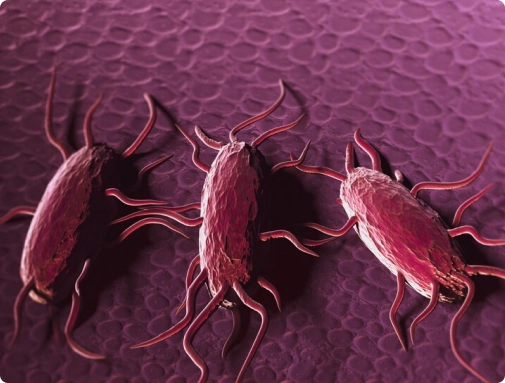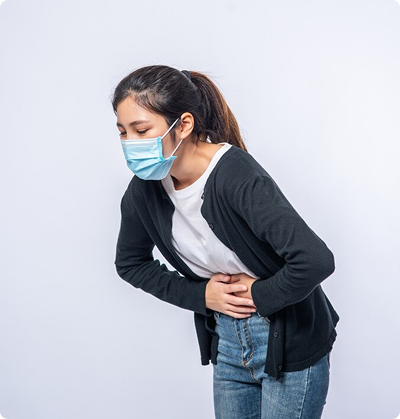Parasitic Infections
Overcome Parasitic Challenges with Confidence
Parasitic infections occur when parasites, organisms that live on or inside a host, invade the human body, extracting nutrients at the host’s expense. These infections vary widely in severity and can affect multiple body systems. While parasitic diseases are most common in tropical and subtropical regions, they can occur anywhere, making awareness and timely treatment essential for all.

Common Parasitic Infections We Address
Giardiasis
Caused by Giardia parasites, giardiasis leads to symptoms such as watery diarrhea, abdominal cramps, nausea, and bloating. It’s commonly spread through contaminated water and poses risks for travelers and those in areas with poor sanitation.
Pinworm Infection
Characterized by intense anal itching, particularly at night, this infection is caused by Enterobius vermicularis. It is highly contagious, especially among children, and requires targeted treatment to eradicate.
Hookworm Infection
Caused by Ancylostoma or Necator species, hookworm infection leads to blood loss, anemia, fatigue, and weakness. The parasites penetrate the skin, often through bare feet in contaminated soil.
Cysticercosis
This serious infection results from ingesting eggs of the pork tapeworm (Taenia solium), which can cause cyst formation in muscles, eyes, and the brain, potentially leading to neurological symptoms like seizures.
Schistosomiasis
Caused by Schistosoma species, this infection involves exposure to freshwater containing larvae released by snails. Symptoms include abdominal pain, diarrhea, blood in urine or stool, and chronic complications if untreated.
Lymphatic Filariasis
Transmitted by mosquito bites, this infection causes lymphatic system damage, leading to lymphedema and elephantiasis, which are characterized by severe swelling of limbs.
Recognizing Symptoms of Parasitic Infections
Symptoms may vary but commonly include:
- Digestive disturbances such as diarrhea, abdominal pain, bloating, and nausea
- Persistent fatigue and generalized weakness
- Skin rashes, itching, or visible signs of infestation
- Unexplained weight loss and poor appetite
- Fever, chills, and night sweats
- Muscle aches and joint pain
- Neurological symptoms in severe or systemic infections, including seizures, confusion, or headaches
Early recognition and diagnosis improve treatment outcomes.

Our Telehealth Approach
- Same-day virtual appointments to address urgent concerns
- Electronic prescriptions sent securely to your pharmacy
- Follow-up consultations to monitor response to treatment and recovery progress
- Convenient, confidential access to expert care from your home
Preventing Parasitic Infections
Prevention focuses on minimizing exposure through hygiene and protective measures:
- Maintain rigorous hand hygiene, especially before meals and after restroom use
- Practice safe food handling by thoroughly cooking meats and washing fruits and vegetables
- Drink only treated or bottled water, avoiding potentially contaminated sources
- Avoid walking barefoot in areas where hookworms are common
When to Seek Immediate Medical Attention
Seek urgent care if you experience:
- High or persistent fever
- Severe abdominal or chest pain
- Neurological symptoms such as seizures, confusion, or severe headaches
- Signs of dehydration including dizziness, rapid heartbeat, or reduced urine output
- Persistent vomiting or diarrhea causing inability to keep fluids down
Early intervention is crucial in serious parasitic infections to prevent lasting damage.
Schedule a Telehealth Appointment
If you suspect a parasitic infection or experience related symptoms, don’t hesitate to reach out. Our telehealth services provide timely, expert diagnosis and treatment, delivered safely and conveniently. Take control of your health today.
